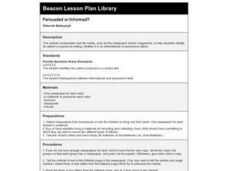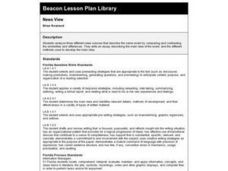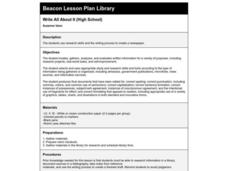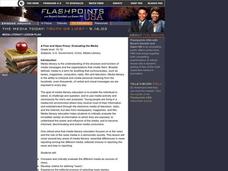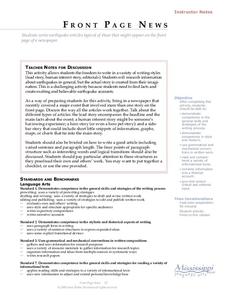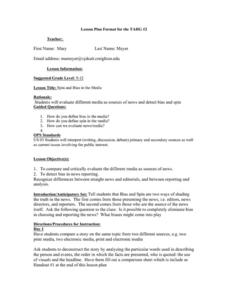Curated OER
Opinion through the Ages: Exploring 40 Years of New York Times Op-Eds
What is the role of a newspaper's Op-Ed page? High schoolers explore the New York Times' "Op-Ed at 40," an interactive feature that lets them browse through 40 years worth of op-ed features, and consider the purpose and value of this...
Curated OER
Persuaded or Informed?
Give each learner a newspaper for this lesson! As a group, read select editorials and discuss them with your class. Are these articles informational or persuasive? Cut out select editorials and have learners identify the purpose of each...
Curated OER
McCarthyism: 60 Years Later
Explore legendary cartoonist Herb Block's bold challenge of McCarthy-era politics through this analysis activity. Two cartoons are included, along with talking points to prompt analysis and background information to help pupils "read...
Curated OER
Preparing for the Possibility of Terrorists
High schoolers investigate what schools and communities can do to be prepared for terrorist attacks, review school's disaster plan, research types of possible attacks, prepare infographic that makes facts clear, and write news article...
Curated OER
Mustang: Wild Spirit of the West
Students write a day in the life story from the point of view of another endangered animal. Students write to your local newspaper to express their opinions on the issue. Students research a horse's diet and explain why horses have...
Curated OER
News View
Students read and analyze three different news sources that describe the same event. They compare/contrast the similarities and differences of the news sources, and write an essay describing the main event.
Curated OER
Write All About It
Fourth graders use research skills and the writing process to create a newspaper. Although students work in groups to complete the final draft of the newspaper, each student is responsible for doing his or her own research and writing...
Curated OER
Beginning With Writing
Students brainstorm what it means to "convey ideas in writing" They review the standard graphic clarify vocabulary and Discuss the importance of having a standard definition for writing and making sure everyone is in agreement of that...
Curated OER
Yellow Ribbons Show Support
Young scholars research ribbon campaigns in the community. They interview students and community members who wear ribbons representing various campaigns. Young scholars write a feature about these people and the campaigns.
Curated OER
Science TV: Making it Real
Students explore the ways science is presented in a children's television show. Students conduct internet research, and then create and design a skit that highlights the problem-solving process.
Curated OER
Persuasive Elements
Investigate letters to the editor and their persuasive qualities. Break your class into reading groups and give each one a different article. As they read, they complete a graphic organizer to record their thoughts and opinions. There is...
Curated OER
Forms Of Knowledge
Students put writing pieces into categories to show different organizational features in writing. In this writing lesson plan, students are shown examples of speeches, poems, editorials, cartoons, parodies, historical fiction, and more.
Curated OER
Burial "Rights"
Students, after viewing several segments of the video, "Stories Under the Stones," discuss the pros/cons of separate burial areas for different groups of people. They analyze a series of documents regarding the burial policy of one...
Curated OER
A Free and Open Press: Evaluating the Media
Students compare and critically evaluate the different media as sources of news, develop criteria for defining "news", experience the editorial process of selecting news stories and detect bias in news reporting.
Curated OER
Front Page News
Students write original earthquake articles typically found on the front page of a newspaper. Each student has the freedom to write in a variety of writing styles (lead story, human interest story, editorials, etc.). They research...
Curated OER
Reading a Newspaper
Students define the terms associated with parts of a newspaper. They identify various sections of a newspaper and the type of articles found in each and provide the responses to who? what? when? where? and why? contained in a ...
Curated OER
Spin and Bias in the Media
High schoolers compare different types of media. In this media comparison lesson plan, students will assess the where all types of media gets its information by viewing a video of a news story and critiquing it.
Curated OER
Read All About It!
Young scholars research and develop a newspaper based on the day they were born. In this newspaper lesson plan, students write an editorial, look for a political cartoon, draw a visual and find music from that year. ...
Curated OER
Discriminating Issues
Young scholars examine how U.S. Law Defines Discrimination In this lesson. They research the issues surrounding a variety of types of discrimination, and then write editorials analyzing legal and social positions on discrimination in the...
Curated OER
The Bill of Rights Is in the News!
Students determine currency of the Bill of Rights by locating current newspaper articles or editorials that support or refute each of the 1st Ten Amendments.
Curated OER
Ida Tarbell: Hysterical Woman vs. Historical Facts
High schoolers examine journalism and its different styles. In this effective communication instructional activity students create an editorial message and articulate an article.
Curated OER
Whose Neighborhood is It? Whose America is This?
Students use electronic resources to study immigration issues, analyze immigration issues dealing with security, economics, lawfulness, culture, and human rights, and discuss possible solutions. Students then express their opinions by...
Curated OER
The Diary of Anne Frank
Eighth graders apply knowledge of the Holocaust in general and The Diary of Anne Frank in particular to their writing. Acting the play out in class provides them an almost firsthand knowledge of Anne and the other characters.
Curated OER
What's Wrong - Intensive Reading
Students discuss the different types of reading and when to use each type. They read passages and try to find the mistake in each sentence.



